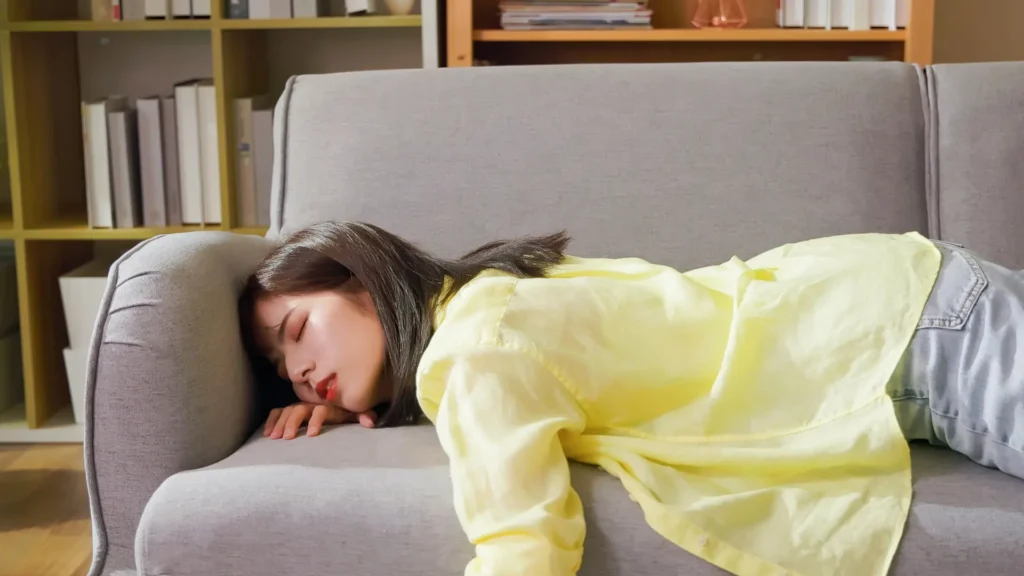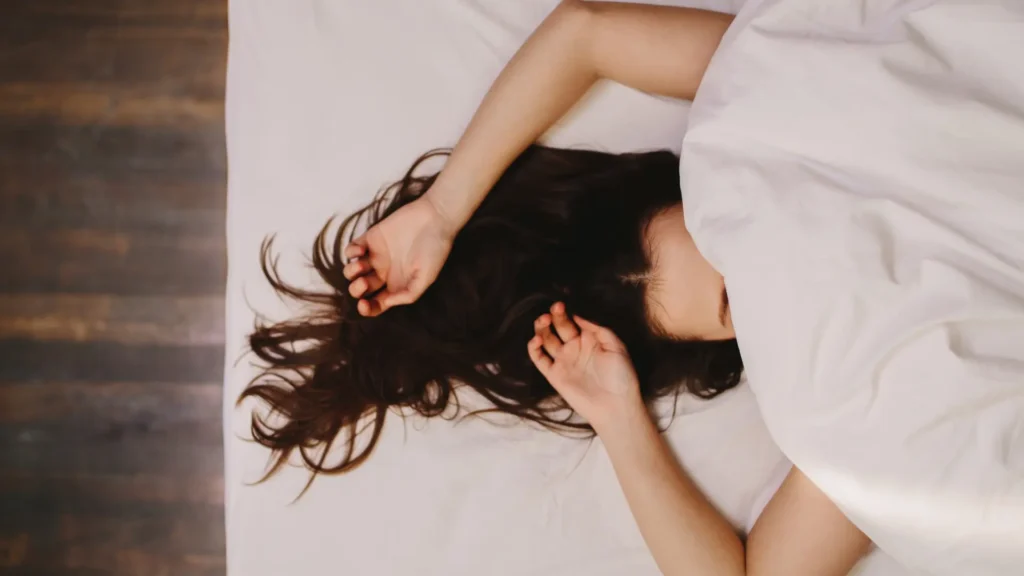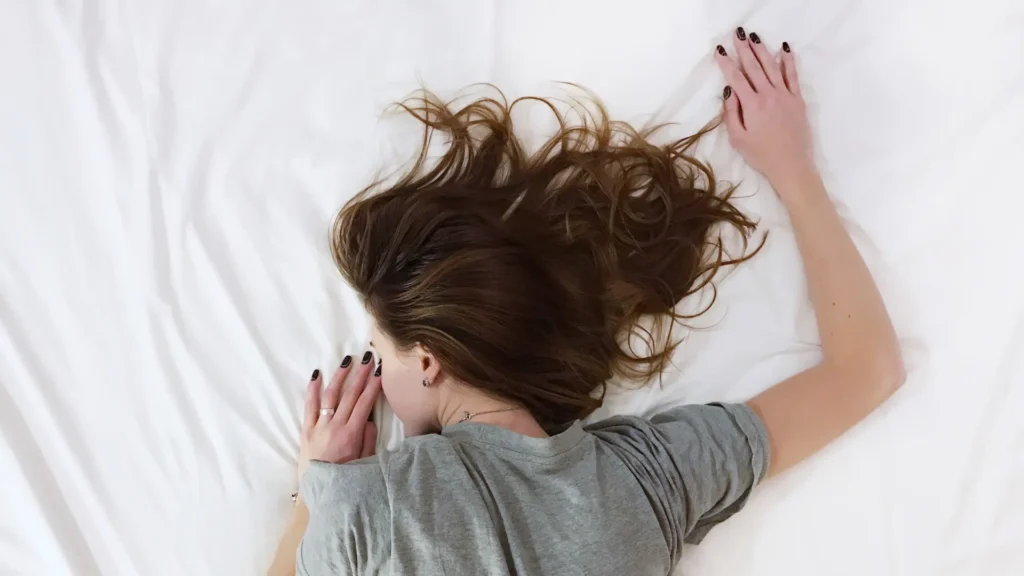Most people use pillows when sleeping, considering them essential for comfort and support. However, a growing trend suggests that sleeping without a pillow can offer several potential benefits for overall health and well-being. There are some studies that promote this too.
While it may seem unconventional, this practice is gaining popularity among those seeking natural ways to improve their sleep quality and address various health concerns. In this article, we will discuss the potential benefits of sleeping without a pillow.
Improved Spinal Alignment
One of the primary benefits of sleeping without a pillow is improved spinal alignment. Pillows, especially those that are too thick or firm, can cause your neck and spine to bend unnaturally. This misalignment can lead to discomfort, stiffness, and even chronic pain in the neck and back regions.
By sleeping without a pillow, your head and neck remain in a neutral position, allowing your spine to maintain its natural curve. This proper alignment reduces the strain on your muscles and joints, minimizing the risk of neck and back pain. Additionally, it can help alleviate existing discomfort caused by poor sleeping posture.
Better Breathing and Circulation
Another one of the benefits of sleeping without a pillow is improved breathing and circulation. Pillows can restrict airflow by compressing the neck and chest area, leading to potential breathing difficulties or snoring. This restriction can also impede blood flow, which is essential for delivering oxygen and nutrients to various parts of the body.
Sleeping without a pillow removes this obstruction, allowing for unobstructed breathing and improved circulation. This can be particularly beneficial for individuals with respiratory issues, such as sleep apnea or allergies, as well as those seeking to optimize their overall cardiovascular health.
Reduced Wrinkles and Skin Aging
For those concerned about their appearance, sleeping without a pillow may offer a solution to reduce wrinkles and skin aging. Pillows can create sleep lines and wrinkles on your face due to the compression and friction caused by the fabric against your skin throughout the night.
By eliminating this constant pressure and friction, sleeping without a pillow minimizes the formation of sleep lines and wrinkles, potentially improving skin health and appearance. This benefit can be especially appealing for individuals who prioritize maintaining a youthful and radiant complexion.
Relief from Allergies and Sinus Issues
Pillows can harbor a variety of allergens, including dust mites, mold, and pet dander, which can trigger allergic reactions and sinus issues. Even with regular cleaning and replacement, these allergens can accumulate over time, exacerbating symptoms for those with sensitivities.
Sleeping without a pillow reduces exposure to these triggers, potentially providing relief from allergies, sinus congestion, and other respiratory issues. This benefit can be particularly valuable for individuals living in areas with high pollen counts or those with severe allergies.
Does Sleeping without Pillow help Posture?

Pillows can promote poor sleeping posture by encouraging unnatural body positions or misalignments. The impact of sleeping without a pillow on posture depends on your preferred sleeping position:
Stomach Sleepers: Sleeping without a pillow may improve posture for stomach sleepers by allowing the head, neck, shoulders, and upper back to remain in a more neutral position. A pillow can force the neck into an unnatural angle for this position.
Side Sleepers: Side sleepers typically need a pillow to support their neck and fill the gap between their head and the mattress. Sleeping without a pillow can impair posture by causing the head to sag and the neck to bend at an awkward angle.
Back Sleepers: For back sleepers, sleeping without a pillow may cause the head to tilt downward, putting pressure on the neck and compromising spinal alignment. A medium-loft pillow is generally recommended to maintain proper posture in this position.
Body Alignment
Sleeping without a pillow also encourages better body alignment, as you naturally adjust to find a comfortable and supportive position for your head, neck, and spine.
This practice can increase body awareness, as you become more attuned to the subtle shifts and adjustments needed to maintain proper alignment throughout the night. Over time, this heightened body awareness may translate into better overall posture, reducing the risk of musculoskeletal issues and promoting a more confident and upright stance.
What are the sleeping without pillow benefits for hair?
While there isn’t a correlation with sleeping without a pillow and hair health, some people believe pillows, especially tossing and turning on them, can cause dry and frizzy hair. Therefore, eliminating pillows might help reduce friction and potential hair damage. However, there is no scientific evidence provided to support this claim.
What are the sleeping without pillow blood flow benefits?
There are some benefits of sleeping without a pillow and improved blood flow. They are:
Improved Circulation: Sleeping without a pillow can potentially improve blood flow and circulation. When your head is elevated by a pillow, it can restrict blood flow, leading to issues like morning headaches or poor sleep quality. Sleeping without a pillow allows for unobstructed blood flow to the head.
Reduced Headaches: By improving blood flow to the head and maintaining a more natural position, sleeping without a pillow may help reduce the occurrence of morning headaches, which can sometimes be caused by restricted oxygen supply to the head due to elevated positioning.
Potential Drawbacks
While sleeping without a pillow offers several potential benefits, it’s important to acknowledge that it may not be suitable for everyone. Some individuals may experience discomfort or an adjustment period when first transitioning to this sleeping style.
Additionally, individual preferences and needs vary, and some people may find that sleeping without a pillow exacerbates existing conditions or causes new issues. For example, those with certain medical conditions or injuries may require the support and elevation provided by a pillow.
It’s essential to listen to your body and make adjustments as needed. If you experience persistent discomfort or issues after trying to sleep without a pillow, it may be best to reintroduce a pillow or seek guidance from a healthcare professional.
What are the sleeping without pillow side effects?
While there are many benefits of sleeping without a pillow, it can also lead to potential side effects especially for certain sleeping positions:
Poor Posture: For side and back sleepers, sleeping without a pillow can put your spine in an unnatural position, straining your neck and joints. This improper alignment can lead to poor posture and discomfort.
Neck Pain: Without the support of a pillow, side and back sleepers are more likely to experience neck pain, stiffness, and muscle tension due to the overextension and uneven pressure on the neck throughout the night.
Headaches: Sleeping without a pillow can restrict blood flow to the head, potentially leading to morning headaches or a feeling of lightheadedness.
Breathing Difficulties: For side and back sleepers, the lack of elevation from a pillow can cause the head and neck to sag, constricting the airways and potentially aggravating issues like snoring or sleep apnea.
Transitioning to Sleeping Without a Pillow
If you’re interested in trying to sleep without a pillow, it’s essential to approach the transition gradually. Sudden changes in sleeping habits can disrupt your sleep quality and lead to discomfort or restlessness.
Start by reducing the thickness or firmness of your pillow, gradually working your way down to a thin cushion or towel as an alternative. This gradual adjustment will allow your body to adapt to the new sleeping position and minimize any potential discomfort or strain.
It’s also crucial to find a comfortable sleeping position that supports your body’s natural alignment. Experiment with different positions, such as sleeping on your side or back, and use additional support like a rolled-up towel or thin cushion under your knees or lower back if needed.
In conclusion, sleeping without a pillow offers potential benefits such as improved spinal alignment, better breathing and circulation, reduced wrinkles and skin aging, relief from allergies and sinus issues, and improved posture and body awareness.
Benefits of Sleeping without a Pillow: Embrace the Pillow-Free Slumber

Sleeping without a pillow may seem unconventional, but it offers a range of potential benefits that are worth exploring. From improved spinal alignment and better breathing to reduced wrinkles and relief from allergies, this practice can positively impact various aspects of your health and well-being.
However, it’s crucial to approach the transition gradually and listen to your body’s needs. While some individuals may experience discomfort or side effects initially, others may find that sleeping without a pillow provides the support and comfort they’ve been seeking.
If you’re considering trying this sleep method, start by gradually reducing the thickness of your pillow or using a thin cushion or towel as an alternative. Experiment with different sleeping positions to find the one that best supports your body’s natural alignment and minimizes any potential discomfort.
Remember, the key to a good night’s sleep is finding what works best for you. Don’t be afraid to try new approaches and make adjustments as needed. Sleeping without a pillow may be the solution you’ve been seeking for improved sleep quality, better posture, and overall well-being.
If you’re ready to explore the potential benefits of sleeping without a pillow, start your journey today. Gradually transition to this sleep method, and pay attention to how your body responds. Embrace the freedom of a pillow-free slumber and discover the positive impact it can have on your health and quality of life.
Today we talked about the Benefits of Sleeping without a Pillow. Here are some related articles you might like:



